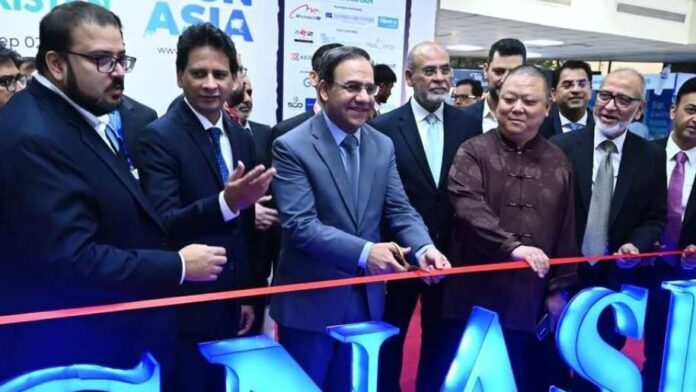Introduction
In a groundbreaking speech at the 23rd ITCN Asia 2023 conference in Karachi, Dr. Umar Saif, the interim federal minister for information technology and telecommunications, outlined his ambitious plan to transform Pakistan into a regional ICT hub. One of the key highlights of his vision is to bring global online payment platforms like PayPal and Stripe to Pakistan. This move, according to Dr. Saif, will not only empower the nation’s vast population of independent contractors but also significantly boost exports by an additional $2 billion.
The Importance of Online Payment Platforms
Dr. Saif’s proposal to introduce PayPal and Stripe in Pakistan comes at a crucial juncture for the country’s IT sector. Pakistan boasts the second-largest population of independent contractors worldwide, but a significant portion of their earnings remains untapped due to the unavailability of such global payment gateways. By enabling freelancers to receive payments seamlessly, Pakistan can harness this untapped potential, resulting in a substantial economic boost.
Strategies for Achieving the $10 Billion Export Target
To achieve the ambitious goal of reaching $10 billion in IT exports annually, Dr. Saif has outlined a comprehensive strategy. This strategy encompasses four key areas:
1. Encouraging IT Companies to Keep Income in Pakistan:
Dr. Saif believes that by instilling confidence in IT companies to maintain their export income within special accounts of Pakistani banks instead of offshore offices, annual IT exports can rise from the current $2.6 billion to $3.5 billion.
2. Facilitating Investment in Infrastructure:
To encourage IT companies to invest in core infrastructure and purchase critical software services and hardware equipment, the establishment of special foreign exchange accounts and online banking platforms is essential.
3. Training 100,000 Software Developers:
A collaboration with the corporate sector will be initiated to train 100,000 software developers. This initiative aims to increase exports by an additional $2 billion annually, bringing the total value of exports to $5.5 billion.
4. Enhancing the Employability of Graduates:
Recognizing that only 10% of graduates from Pakistani higher education institutions are employable, Dr. Saif plans to bridge this gap by implementing various training programs and boot camps. This initiative will create numerous job opportunities for graduates within the nation, contributing to economic growth.
The Gig Economy and Tax Reforms
Dr. Saif acknowledges the importance of the gig economy and the need for a supportive ecosystem for freelancers. To further facilitate this sector’s growth, the government will collaborate with the private sector to establish 5,000 freelancer points in various cities. Additionally, a reduction in the tax rate on freelancers’ income to match the IT sector’s 0.25% rate will make participation in the gig economy more appealing.
Venture Capital and Technological Advancements
Dr. Saif emphasizes the creation of a de-risking mechanism for venture capital, which could reignite the startup culture’s investment trend. The ministry’s plan to establish a fund of funds with 30% government ownership aims to support innovative ventures.
In terms of technological advancements, Dr. Saif promises the rollout of 5G technology through the auction of 300 MHz. This move, after consultation with all stakeholders in the telecom sector, will not only make 5G accessible but also double the spectrum’s capacity to meet growing client demand.
Supporting Mobile Phone Manufacturers
Recognizing the importance of mobile phone manufacturing, Dr. Saif proposes a specific financing facility for mobile phone makers. This initiative aims to increase the production of mobile phone handsets with improved quality, contributing to the country’s economic growth.
Collaborative Efforts for Success
During the conference, various key figures from both the public and private sectors expressed their support for Dr. Saif’s vision. These included Saleem Ullah, CEO of the State Bank of Pakistan, Babar Bhatti, CEO of Tech Destination Pakistan, and other dignitaries.
ITCN Asia 2023: A Platform for Growth
The 23rd edition of ITCN Asia, the premier exhibition for the IT and telecom industries, signifies the nation’s commitment to the sector’s growth. Tech Destination Pakistan, the event’s title sponsor, along with partners like UNIFONIC, Google, and P@SHA, reflects the industry’s growing prominence. With over 450 organizations and 100 international delegates from eight nations, this event promises to be a catalyst for technological advancement and economic growth in Pakistan.
Conclusion
Dr. Umar Saif’s visionary plan for Pakistan’s IT sector is poised to revolutionize the industry and boost the nation’s economic prospects. The introduction of global payment platforms, support for freelancers, tax reforms, venture capital initiatives, and advancements in technology infrastructure all form part of a comprehensive strategy. Collaborative efforts from public and private sectors, as seen in ITCN Asia 2023, will be crucial in turning this vision into reality, making Pakistan a regional ICT hub and a global IT powerhouse.

